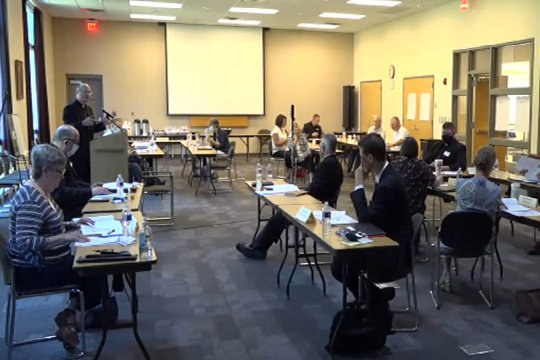Themes, patterns emerge for diocesan pastoral plan
In seven sentences in “Evangelii Gaudium” (“Joy of the Gospel”), Pope Francis’s apostolic exhortation on the New Evangelization, the reigning pontiff presents a clear vision for reinvigorating parish life throughout the world.
That vision focuses on looking outward and ministering deliberately and creatively to all people living within the territory of the parish — not just those who take part in parish life.
“In all its activities the parish encourages and trains its members to be evangelizers. It is a community of communities, a sanctuary where the thirsty come to drink in the midst of their journey, and a center of constant missionary outreach,” the pope stated in Section 28 of the document.
All parishes must undergo continuous conversion in order to become “environments of living communion and participation, and to make them completely mission-oriented,” the pope insists.
The emerging pastoral plan for the Diocese of Jefferson City must be fundamentally welded to that vision, Bishop W. Shawn McKnight told the members of the Diocesan Pastoral Council (DPC) during a three-and-a-half-hour work session Aug. 22.
“The inspiration of our pastoral planning process must be focused entirely upon parishes and how we might sustain and help our parishes in the Jefferson City diocese make this dream become a reality,” the bishop stated.
From the ground up
The DPC is a canonically sanctioned group of lay Catholics representing parishes in each region of the diocese. Members deliberate and advise the bishop on ways to carry-out the mission of the Church more effectively at the parish level.
Last December, parishes throughout the diocese began a guided discernment process for how they will spend the next few years bringing Pope Francis’s vision for parish life closer to reality.
Groups of parishioners gathered regularly during Advent and Lent to discuss implementing in locally relevant ways the bishop’s three priorities for parishes:
- cultivating a spirituality of Catholic stewardship among all parishioners;
- instilling a proper sense of co-responsibility among ordained clergy and the lay faithful; and
- ensuring that each parish will be universally recognized as a center for charity and mercy in its local community.
As the discernment process continued, each parish was directed to bring forth two or three specific, measurable, sustainable goals that the entire parish will focus on toward advancing those three priorities.
Working with other parishes in each deanery, the parishes fleshed out those objectives and submitted them to the diocese in the form of parish pastoral plans.
The diocesan pastoral planning team met each Friday afternoon through the summer to evaluate and categorize each of the plans the parishes submitted.
Out of the many, a few
The purpose of the Aug. 22 meeting was to have groups of DPC members look at all of those plans and try to recognize common themes.
Those themes are informing the development of a diocesan pastoral plan that will go into effect the first Sunday of Advent this year.
“By Advent, each parish will be able to answer the question: What two or three activities happening in the parish will show people that our parish is the kind of parish described in ‘Evangelii Gaudium’?” Bishop McKnight told the DPC members.
Dominic Perry of the National Leadership Roundtable facilitated the meeting, which was a combination of online and in-person participation due to the COVID-19 pandemic.
To help the DPC members with their work, directors of various diocesan ministries gave brief presentations on stewardship, co-responsibility, charity and mercy, youth participation, Hispanic participation and communication.
“We must remember that the diocesan pastoral plan, as we have structured the whole process, is to identify what our diocesan resources and diocesan structures will hold themselves accountable to, in helping the parishes achieve their pastoral plans,” Bishop McKnight reminded the participants.
He believes that along the way, the diocesan pastoral plan will motivate parishes throughout the diocese to keep evaluating and refining their own pastoral plans.
Emerging patterns
Working in four groups at the Aug. 22 gathering, DPC members connected aspects from the parish pastoral plans into several possible themes for the diocesan pastoral plan, including:
- Creating a culture of welcome and hospitality;
- Actively drawing upon the God-given gifts of every member in enhancing the life of the Church;
- Using the most up-to-date communication tools and techniques to lead people to Christ and prepare them for discipleship;
- Motivating all parishioners to invest and volunteer in the work of the Church;
- Helping bolster the charitable works of entire communities;
- Bringing about greater participation among teens and young adults;
- Fostering a diocesan-wide identity based on gratitude and stewardship;
- Helping parishes become more effective in charitable outreach and social concerns;
- Strengthening faith formation and evangelization efforts, especially for the next generation of Catholics;
- Unifying communication across a variety of platforms, both personal and virtual;
- Solidifying effective youth and family ministry; and
- Creating greater awareness of the needs of marginalized communities and a desire to help them.
Moving forward
The DPC members are now working with representatives of the parishes in each of their regions in the diocese (known as deaneries) to prepare for the next gathering on Saturday, Sept. 12.
On that day, representatives of each parish that submitted a pastoral plan will meet with the DPC and members of the diocesan staff to review a working document developed from the themes the DPC members gleaned from their deliberations at the Aug. 22 meeting.
Originally planned to take place in Columbia, the Sept. 12 meeting will now be held digitally in order to safeguard the health and safety of the participants.
In October, the priests of the diocese will respond to the diocesan pastoral plan, during their weeklong Priest Institute.
The plan will be set into action with a pastoral letter from Bishop McKnight the First Sunday of Advent.







